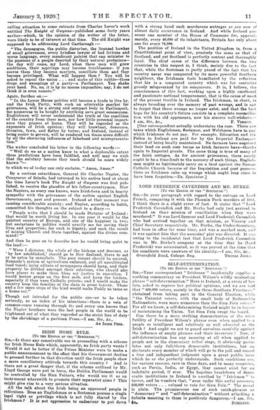IRISH HOME RULE.
[To THE EDITOR. OF THE " SPEOFATOR."]
Sia,—Is there any conceivable use in proceeding with a scheme for Irish Home Rule which, apparently, no Irish party wants P Would it not be better if the Prime Minister were to make a Public announcement to the effect that his Government decline to proceed further in that direction until the Irish people show a more conciliatory attitude towards this country P And is there not a great danger that, if the scheme outlined by Mr. Lloyd George were put in force, the Dublin Parliament would be controlled by the Sinn Feiners, who would use it as an instrument wherewith to promote their separatist aims P This might give rise to a very serious situation.
All the talk about the Irish being an oppressed people is ridiculous. Doman Englishman or a Scotsman possess a single legal right or privilege which is not fully shared by the Irishman P It is not oppression to endeavour to put down with a strong hand such murderous outrages as are now of almost daily occurrence in Ireland. And while Ireland pos- sesses one member of the House of Commons for, approxi- mately, every 40,000 of its inhabitants, Britain has only about one for every 74,000.
The position of Ireland in the United Kingdom is, from a Constitutional point of 'view, precisely the same as that of Scotland, and yet Scotland is perfectly content and thoroughly loyal. The chief cause of the difference between the two countries in this respect is, I think, mainly due to the fact that, while the Scotsman is justly proud of the fact that his country never was conquered by its more powerful Southern neighbour, the Irishman feels humiliated by the reflection that his is a conquered country which was for centuries grossly misgoverned by its conquerors. It is, I believe, the consciousness of this fact, working upon a highly emotional and passionate national temperament, that is the cause of most of the present trouble in Ireland. The Irishman, in short, is always brooding over the memory of past wrongs, and is apt to forget that those wrongs no longer exist, and that the best hope for his country's future consists in a complete reconcilia- tion with his old oppressors, now his sincere well-wishers.—
[Our correspondent actually understates the case. There are taxes which Englishmen, Scotsmen, and Welshmen have to pay which Irishmen do not pay. For example, Education and the Police in Ireland are paid for by the Imperial Exchequer instead of being locally maintained. No farmers have acquired their land on suoh easy terms as Irish farmers have—thanks again to Imperial grants. The same thing is true of many of the Irish cottages. As for ancient grievances, there surely ought to be a time-limit to the memory of such things. English- men might as legitimately carry on a feud against the 110111RD Catholic Church because of the Inquisition and past persecu- tions as Irishmen rake up wrongs which ought long since to have been forgotten.—En. Spectator.]










































 Previous page
Previous page